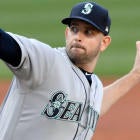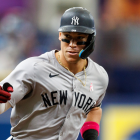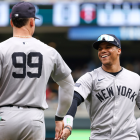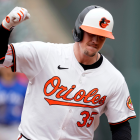Back in mid-May, the Seattle Mariners looked like they were finished. Second baseman Robinson Cano fractured his hand on May 13, and later in the week was suspended for failing a performance-enhancing drug test. The Mariners entered May 14 -- the official beginning of the post-Cano period -- with a 22-17 record and a 2.5-game deficit in the American League West. That gap was expected to increase over the coming weeks
Yet 21 games later, the Mariners have avoided circling the drain. Rather, the M's will enter Wednesday's game against the Houston Astros in first place and having won 16 of their 21 games without Cano. A win against the Astros will give the Mariners a three-game lead.
How have the Mariners done it? With cartons full of goose eggs.
The Mariners have held their opponents to 2.81 runs per game since May 14, a figure that would be the lowest in baseball if it represented their full-season marks -- to the extent that only two teams, the Astros included, would be within a half run per game. Simultaneously, the Mariners have scored just 3.76 runs per game without Cano -- an average that would be the third-worst in the majors if the same rules applied. Put another way, the Mariners are 9-3 in the 12 games they've scored three runs or fewer, and 12-0 when they've held opponents to two runs or fewer.
The pitching staff has served as the M's life preserver. Emphasis on "pitching staff" because 1. Seattle ranks middle of the package in defensive efficiency; and 2. everyone has contributed.
James Paxton, the staff ace, has pitched like it: he's averaged seven innings per over his last four starts, all the while accumulating a 1.88 ERA and five strikeouts per walk. Marco Gonzales has permitted just 16 hits and one earned run in his last 26 innings, while Wade LeBlanc of all people has a 2.01 ERA his last four trips out. Even Mike Leake, who began the season in a rut, has joined in on the fun, leaving Felix Hernandez as the odd-man out. Hernandez's 4.68 ERA, by the way, is the highest on the M's over the last few weeks, minimum five innings. Go figure.
In the bullpen, Edwin Diaz has reeled off eight saves despite allowing six runs in 12 innings. Juan Nicasio, an offseason addition, and Alex Colome, an in-season addition, have combined to toss 19 innings and allow 10 hits, two earned runs, and two walks -- oh, and they've also combined to strike out 27 batters. Pick a name, almost any name, and you'll find a pretty ERA. To wit, Chase Bradford, Christian Bergman, and Dan Altavilla haven't allowed an earned run in their last 21 combined innings.
Diving beyond the surface, the keys to the Mariners' pitching success as of late have been throwing strikes and keeping the ball in the park. Seattle's pitchers have yielded just eight home runs in 200 innings since May 14 -- for reference, the Philadelphia Phillies have given up the second fewest over that timespan, and they've allowed 13. Factor in how the Mariners the third-lowest walk rate in baseball and opponents are having to string together hits of the non-home-run variety in order to score. Few have succeeded.
Obviously all of the above is meant to be descriptive and not predictive -- what has happened, as opposed to what will happen. The predictive is somewhat obvious: the Mariners are not going to continue to pitch this well; Gonzales and LeBlanc and others will see their performance come back to Earth; a few sliders will be hung and fastballs will misplaced and Seattle's opponents will hit more than a home run every few games; and so on and so forth.
Whether the Mariners can find enough offense to hang around once their pitching regresses is to be determined -- "probably not" is an informed guess, based on their talent level and their limited trade potential. But if you want to know how the Mariners have not only remained in the race, but morphed into the pace car in the AL West, then look no further than their pitching staff.






















